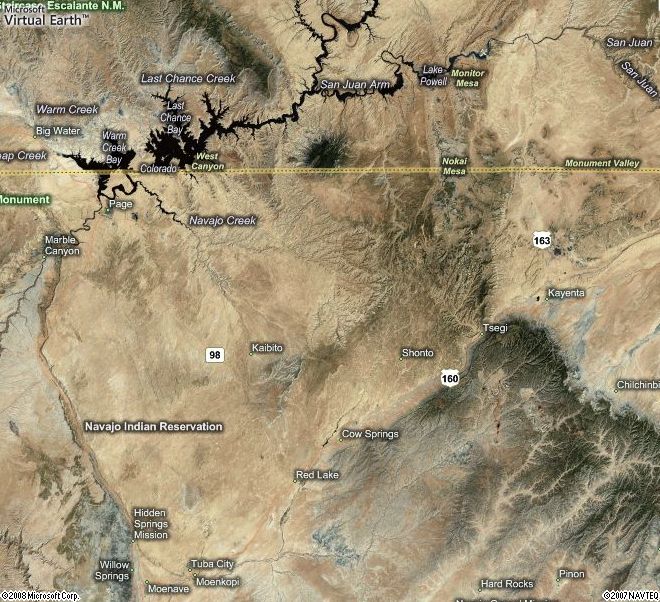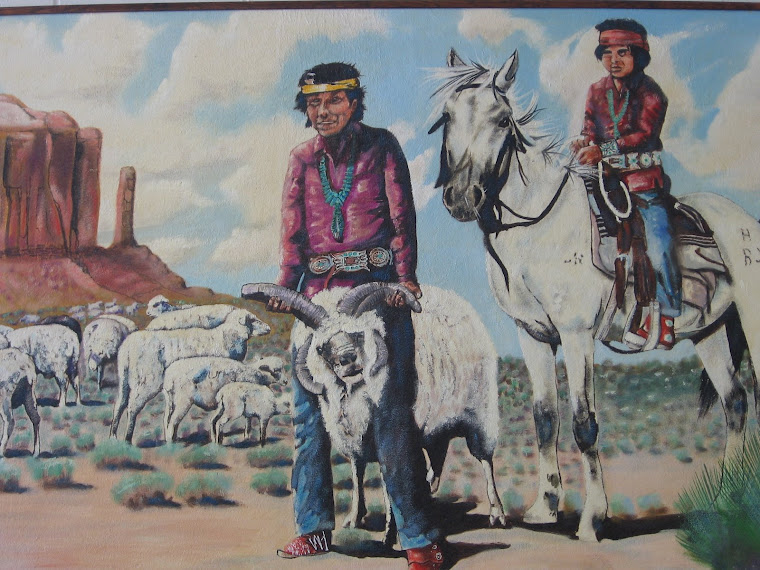Navajo president pushes reduction of tribal lawmakers
By FELICIA FONSECA Associated Press Writer
Article Launched: 04/29/2008 05:06:42 PM MDT
WINDOW ROCK, Ariz.—Navajo President Joe Shirley Jr. is moving forward with a plan to reform the tribal government and first on his wish list is reducing the Tribal Council from 88 delegates to 24. Shirley's staff filed paperwork Tuesday with the tribe's election office that will start the process in gathering signatures to put the question before voters. The petitioners will have six months to collect about 16,000 signatures, but Shirley said the goal is to get at least 25,000 in 90 days so that the matter could go before voters in the November elections.
"The sentiment of the people, I feel, is that they want to reform government," he said in a recent interview. "I don't think a lot of them like the way our government is run."
J.R. Thompson of the Navajo Nation Election Administration said his office received the documents late Tuesday. The names of petitioners need to be checked against voter registration rolls before signatures can be gathered, and Thompson said that could take a couple of days.
"Until we see that everything is proper and in order, then they can proceed with it," he said.
Shirley announced the formation of a government reform task force last week during the council's spring session. He also wants voters to approve a line item veto that would give him the authority to approve or reject certain budget items or supplemental appropriations.
Former Arizona state Rep. Sylvia Laughter, acting executive director of the Office of Navajo Government Development, said while she supports a move to reduce the council, she sees Shirley's push for a line item veto as a power play.
"The line item veto tells me that he's not willing to work with the legislative body," she said. "At the same time, the legislative body is just as much at fault. ... There just seems to be a lot of difficulty in moving forward with anything."
The executive and legislative branches have been at odds recently over a proposed $36 million legislative complex, discretionary funds and the draining of a capital improvement fund.
While Shirley has exercised his veto power on a number of bills he said included unnecessary appropriations, the council hasn't hesitated to override those vetoes.
One of Shirley's biggest challenges in reducing the council likely will come from the delegates.
More than half of the 88 tribal lawmakers represent two or more communities, and downsizing the council would cheat communities out of representation in the tribal capital of Window Rock, said council Speaker Lawrence Morgan.
"The Navajo people should be worried about the president's move," he said.
Navajos voted in a 2000 referendum to reduce the council to 24 delegates, but the measure failed because its language required a majority vote in each of the tribe's 110 chapters.
Delegate Leonard Tsosie said he believes Navajo voters would be receptive to reducing the council and having delegates work harder to get elected.
"It will be harder, more competition, but in a way I don't mind," he said. "I think the Navajo people should be afforded the competition of ideas on how to make better their own lives, their community and the Navajo Nation."
If a reduction is approved, only 24 delegates would be elected in 2010. The Navajo Board of Election Supervisors would reapportion the delegates with approval of the current council by August 15, 2009. If the council rejects the plan, the Navajo president would have the authority to develop and approve a plan.
The line item veto would go into effect immediately if approved.
Delegate Leslie Dele said Shirley should have a plan before the issues are voted on.
The council created a reform office shortly after the tribal government was reorganized in 1989 under three branches—the executive, legislative and judicial—though Navajo voters never ratified the change. Previously, a chairman served as both the head of the tribal government and the speaker of the council.
The council voted late last year to place the office under the administrative control of Morgan. Shirley vetoed the measure, but the council overturned it.
Laughter's main focus has been looking at the feasibility of establishing a Navajo constitution. The Navajo Nation is one of a few tribes that rejected a constitution under the Indian Reorganization Act of 1934.
Shirley suggested that a constitution could be part of government reform, but said "It's not my initiative."
Dale Mason, a political science professor at the University of New Mexico's Gallup branch, said there is widespread support for reducing the council—partly to save money—but doesn't believe Shirley has the clout to pull it off.
"I think there are a lot of Navajos that would like the Navajo government changed, but I don't think there's a consensus on what it should be," he said.
29.4.08
Subscribe to:
Post Comments (Atom)
















No comments:
Post a Comment